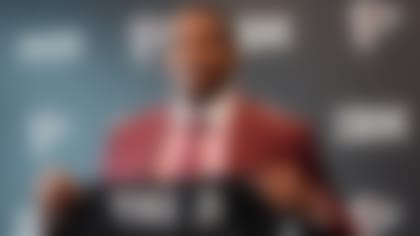The New England Patriots entered the offseason with some of the league's worst position groups. Unlike how it seemed last year, Bill Belichick knows it.
The Patriots' spending spree on Monday -- the first day of the legal tampering period -- was telegraphed, yet still surprising. Belichick ate a huge amount of dead money on New England's salary cap in 2020 to wave goodbye to Tom Brady. That didn't work out well. When the Patriots wound up with a mountain of salary cap space in an offseason where few teams had such flexibility, it felt like it was by design. Belichick started to cash in his chips Monday, in the wake of a 7-9 season where the Patriots' defense and passing game collapsed.
Former Titans tight end Jonnu Smith, former Ravens pass rusher Matt Judon and former Raiders wideout Nelson Agholor are the type of quality starters who get superstar money in free agency. The following two things can be true at the same time: All three players significantly upgrade huge weaknesses on the Patriots' roster and they also are the kind of free-agent contracts Belichick usually avoids. This is not Belichick swooping in to steal Stephon Gilmore or signing Darrelle Revis to a one-year contract. These are not All-Pros.
Smith has a Pro Bowl ceiling and was my top tight end available this offseason, but he's yet to top 500 yards in a season. He will expand the Patriots' playbook, especially in the red zone. And he agreed to a deal that will pay him more guaranteed money than any tight end in history. Judon will see similar money, with $32 million over the first two years of his contract. He and Smith are both versatile, hard-working players who can do a little bit of everything. But Judon is not exactly a pure pass rusher like Chandler Jones; he's closer to a Kyle Van Noy or Rob Ninkovich type who can handle a number of assignments well with great effort and toughness. The contract comes at a premium for that type of player, one the Patriots often try to find on the cheap. Agholor lit up the Patriots in Super Bowl LII and was the Raiders' best receiver last year, but $26 million over two years is a ton for a six-year veteran who hasn't topped 900 yards in a season yet.
Belichick didn't have the luxury to look for value. The team's other Monday deals (former 49ers slot receiver Kendrick Bourne, former Dolphins defensive tackle Davon Godchaux and former Eagles safety Jalen Mills) reflect that, too. If Cam Newton is the Week 1 starter next year, he'll have better weapons to throw to, even if the group of pass catchers is still below league average. Belichick needed guys to play snaps and knew that the last few draft classes weren't providing much help. Most of these contracts amounted to two-year deals in terms of guaranteed money and the presumption is that the salary cap will rise significantly in the future.
(UPDATE: The Patriots continued their aggressive approach to free agency on Tuesday, nabbing tight end Hunter Henry with a three-year, $37.5 million deal that includes $25 million guaranteed, per NFL Network Insider Ian Rapoport.)
The signings make sense for the 2021 Patriots, but they are also a reflection of where the franchise is entering 2021. The Pats no longer have a top-tier quarterback and their stockpile of homegrown talent has thinned out considerably. They had no other choice but to spend in free agency, which is the type of predicament that division foes like the Dolphins and Jets have faced for much of the last couple decades. New England's paying a premium for poor team planning -- and if the history of free-agent deals that get done on Day 1 is any indication, this group of Patriots signings will have more misses than hits.
Here are some other takeaways from a busy Day 1 of the NFL's legal tampering period.
The Bucs are running it back. Tampa Bay Buccaneers general manager Jason Licht had an existential choice to make this offseason. He could use Tampa's combination of key free agents and ample salary cap space to refresh his roster or he could use every resource available to run the same team back. He chose the latter.
There is no right answer to this question, although Licht's approach is the most popular with fans, players and media. Licht telegraphed his intention last Friday when he extended Tom Brady's contract one year. Pushing more guaranteed money into a 2022 season, when Brady will be 45 years old, was Licht's way of saying that he's building this Bucs window to last two more seasons.
Licht used that extra space by bringing back Lavonte David on a two-year contract last week, using the franchise tag to retain receiver Chris Godwin, re-signing Rob Gronkowski to a one-year, $10 million deal Monday and giving Shaquil Barrett $36 million guaranteed on a four-year contract.
This is not how Licht's old boss in New England handled success, even putting the Brady part of the equation aside. Belichick went out of his way to shake up his title-winning rosters, believing new blood helped to emphasize how each year was a start at the bottom of the mountain.
In isolation, most of the Bucs' moves make sense. Godwin was one of Brady's favorite receivers and it made no sense to let a 25-year-old homegrown product leave for nothing. Barrett was at the top of the pass-rusher market and the team would have been thin on the edge without him. David is a franchise legend. Even if he's 31 years old at a position that often isn't valued in free agency, David is undeniably still playing at a high level. They had to pay a lot to retain Gronk after he received interest from the Las Vegas Raiders, but Gronk's usage and production kept him in the top 10 of tight ends last season even in a diminished state.
There is sentiment involved in some of these moves, which isn't necessarily a bad thing. Rewarding players who won a title is fun! It just doesn't necessarily lead to similar results the next season.
The Bucs just have to look at their franchise's only other Super Bowl season for the worst-case scenario. They returned after their 2002 title with the guts of their veteran, marauding defense intact, as well as their efficient enough offense. (Sound familiar?) They went 7-9, dogged by bad luck, aging players, internal squabbles and the "disease of more."
More recent examples of title winners struggling to recapture magic include the 2017 Philadelphia Eagles, 2015 Denver Broncos, 2012 Baltimore Ravens and 2011 New York Giants. The Eagles might be the best comparison because they entered the following season with one of the NFL's most stacked depth charts. The Bucs will, too. Only an avalanche of injuries ruined the Eagles' title defense, and even then, they scraped their way to the Divisional Round.
With this roster -- including a loaded offensive line and young secondary -- anything short of a title contention would be a massive letdown. Still, trying to recreate the same championship alchemy in back-to-back seasons is so difficult that it hasn't happened since 2003-04. The quarterback of those Patriots teams was not yet among the top five at his position, but he played efficient football as part of a loaded roster. Perhaps that's one thing Licht did learn in Foxborough: With Tom Brady around, the normal rules don't apply.
The best value signings have been re-signings. Matt Milano agreed to return to the Bills before the madness started. Cornerback Michael Davis is re-signing with the Chargers. Underrated pass rusher Romeo Okwara is staying with the Lions. Kyle Juszczyk and Jason Verrett will stick with the 49ers. The perennially underrated Shelby Harris finally got a big contract with the Broncos.
These are quality players staying in great situations. The key to essentially any free-agent signing is not money, but fit. These teams know the players best and know they fit.
The salary cap is a state of mind. The Rams reportedly entered Monday $37 million over the cap according to, well, Over the Cap. They still found room to bring back Leonard Floyd on a four-year, $64 million deal. The Titans weren't operating with much cap room, but they still found a way and are signing versatile lineman Denico Autry from the Colts and edge rusher Bud Dupree from the Steelers. Teams can always find a way.
I don't blame Tom Telesco for continuing to spend on the offensive line. I can't think of another general manager with a better overall track record who has been bedeviled by one aspect of team building more than the Chargers' Tom Telesco and his offensive line. He's thrown money, draft picks and coaches at a problem that never goes away.
After cutting last year's trade acquisition (guard Trai Turner) over the weekend, Telesco is making former Packers center Corey Linsley the highest-paid center in the league. The Chargers still need help at tackle, but signing Linsley is worth a shot.
Offensive linemen are not going to come at a discount. Former Patriot Joe Thuney is set to make nearly $50 million over the next three years from the Chiefs to fill their hole at left guard. (They have many more offensive line holes to fill.) The Panthers gave solid money to journeymen Pat Elflein and Cameron Erving. In short: Raise your children to be offensive linemen, not running backs.
The Texans and Jaguars were extremely active. The Texans have signed 11(!) players thus far according to our notable additions tracker. The highest price tags are trade acquisitions Marcus Cannon and Shaq Lawson. They also loaded up on surprisingly generous one-year deals for players like linebackers Christian Kirksey and Kamu Grugier-Hill.
The Jaguars added at least six players on Monday alone, even if the biggest name of the bunch was probably Roy Robertson-Harris, a super sub in Chicago. It's like the Texans and Jaguars couldn't wait to skip ahead to Phases 2 and 3 of free agency.
Defensive linemen were paid more quickly than receivers. I did not expect Nelson Agholor to get the first big receiver contract, while Kenny Golladay, Will Fuller and JuJu Smith-Schuster still await their deals. So many pass rushers at the top and middle of the market found quick homes, including Shaquil Barrett, Yannick Ngakoue, Matt Judon, Romeo Okwara, Carl Lawson, Shelby Harris and Leonard Floyd.
Agholor helped to disrupt the receiver logjam late in the day, followed by Corey Davis flying off to the Jets. Still, more than 10 receivers on my top 101 remain available as of this writing.
The most surprising contract of the day came from the Jets. There was clearly a market for former Lions linebacker Jarrad Davis, who can make up to $7 million with incentives on a one-year contract. That's a reminder that it's good to be a first-round pick, because Davis was a huge disappointment in four seasons with the Lions. (The Jets' deal for pure pass rusher Carl Lawson, on the other hand, was one of my favorite moves of the day.)
The Packers did something rare with Aaron Jones. They could have used the franchise tag on him and saved cash on a one-year contract worth between $8-9 million. Instead, they chose to give Jones a $13 million signing bonus as part of a four-year deal. That will help lower Jones' cap figure in 2021, but ultimately, the Packers made the decision to pay one of their great players more money with a multi-year commitment when they didn't have to. That's just not something you often see, but Jones' talent makes it worth it.
This is Jameis Winston's chance. The Saints' deal to bring back Winston doesn't guarantee him a starting job. Taysom Hill is making more money than Winston and there figures to be a competition to start. Winston's guaranteed money ($5.5 million) is more like a backup's salary.
Still, if Winston can't beat out Hill, then I'll finally give up on Jameis' potential. None other than NFL Network's Kurt Warner said Monday that Winston was a "top-seven" quarterback in terms of reading defenses and seeing the field while in Tampa. (Thanks for the backup, Kurt!) Winston throws with good anticipation and could still be a special quarterback if he cuts down on mistakes. He'll never have a better chance to run a top-shelf offense for a fantastic coach. Winston could still have a Jim Plunkett-like second half of his career, but if Sean Payton can't make this work, then no one can.
Follow Gregg Rosenthal on Twitter.












